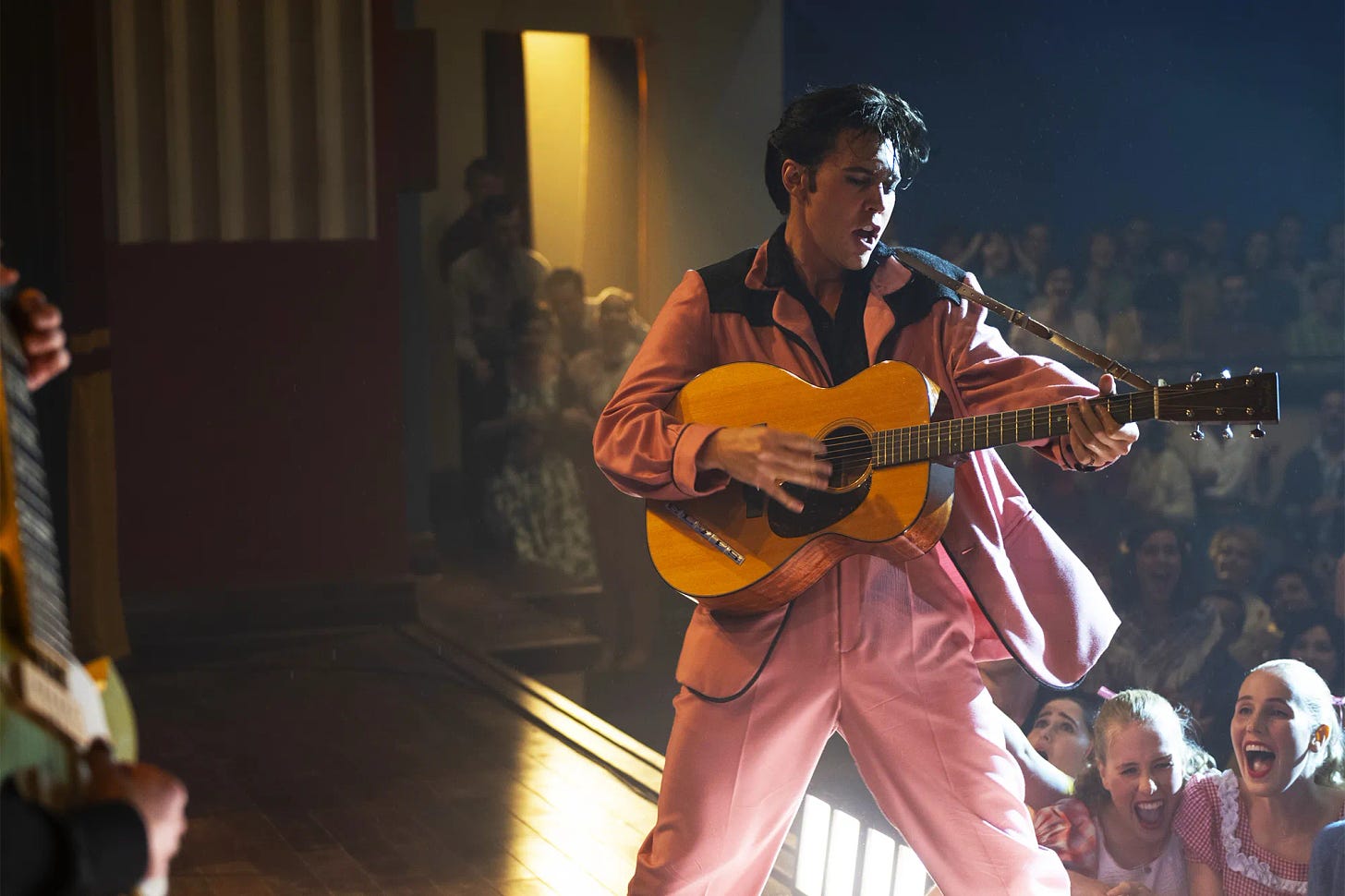In review: 'Elvis'
Baz Luhrmann goes big with a rock biopic that ends up playing by too many of the usual rules.
Elvis
Dir. Baz Luhrmann
159 min.
In 1974, a small label called Boxcar Records issued an album called Having Fun with Elvis on stage. It was an unusual release, culled from concert recordings, featuring not music but scraps of Elvis Presley’s between-song banter, often squirrely non sequitirs that would only make sense if you'd been there (and maybe not even then). Boxcar Records belonged to Presley’s longtime manager Andreas Cornelis van Kuijk, better known by his adopted name of Colonel Tom Parker. Believing he could do an end-run around his client’s label, RCA, he saw a chance to make a buck, and finding a chance, any chance, to make a buck was what Parker did.
The relationship between Parker and Presley (Austin Butler) is at the heart of Elvis, a new almost-cradle-to-slightly-beyond-the-grave Presley biopic in which a dying Parker (Tom Hanks) serves as both narrator and villain, a kind of malignant force determined to leech whatever he can from the once-in-a-century talent he calls “my boy,” never mind the consequences to Presley’s career and reputation. Beneath layers of prosthetics and a Deep South-by-way-of-Holland accent, Hanks plays him as an outsized character of Dickensian proportions, handcrafted to the director’s outsized style.
The Reveal is a reader-supported newsletter dedicated to bringing you great essays, reviews and conversation about movies (and a little TV). While both free and paid subscriptions are available, please consider a paid subscription to support our long-term sustainability.
Unfortunately, like most of Elvis, that only sounds like a good idea. Luhrmann brings his trademark more-is-more approach to the film but again proves it only really works when allowed to go to the dizzying extremes of Romeo + Juliet and Moulin Rouge! Here the style has to serve the needs of a biopic that’s, at heart, not that interested in breaking the biopic rules as it hits the Presley high points and a few nadirs. (Though it doesn’t really hit the requisite “dark fucking period,” to use Dewey Cox’s phrase, until the final stretch.) That it somehow, however paradoxically, ends up feeling at once rushed and interminable may be its most interesting quality.
The Parker vs. Presley conflict is the closest Elvis comes to finding an angle on the Presley story. Otherwise, Luhrmann mostly moves from incident to incident propelled by the momentum of some promising early scenes that capture just how strange Presley, a longhaired truck driver with a taste for Black music and Black fashion, must have seemed to the other residents of his white housing Memphis housing project in the 1950s, and the shock it was to see him perform in his early days. The film’s never more electric than in depicting Presley’s appearance on the Louisiana Hayride radio show, a scene that allows to Luhrmann to bring the full power of his style to bear as Elvis flashes between Presley’s musical past and his own thrilling entry into musical history with a blend of R&B and country that shocked and scrambled American culture.
But did Elvis really need the full Luhrmann treatment? One element within the film suggests it might have benefitted from a different approach. Star Austin Butler is disarmingly perfect as Presley, capturing his mannerisms and vocal demeanor — including the unfailing politeness that served as a counterbalance to his on-stage wildness — but also making him feel present and alive and not just a figure from the pages of musical history. It’s a sensitive approach that captures the humanity beneath the icon, at least when the film slows down to catch its breath.
If only Elvis gave a little more room for Butler to breathe. Mostly Luhrmann pushes Presley from stop-to-stop on the Elvis timeline, offering an exaggerated but largely accurate account of how a kid transformed by music changed the world but eventually lost himself, becoming the drug-addled, giggling shell of his former self captured in the album Parker used to hawk at concerts—a rise and fall interrupted only by a long (and mostly rambling) sequence dedicated the 1968 television special that, however briefly, recharged and refocused the star as he found reached back to his past and strived to make the music of his present just as powerful and relevant to a new era. If his story had any meaning beyond a cautionary tale about hooking up with bad management, however, it’s outside Luhrmann’s scope. —Keith Phipps






Way late to the party on this but for posterity's sake, I would say the interesting element Luhrmann adds here is to heighten the ghoulishness of Tom Parker in order to elevate the innocence & goodness of Elvis, both by contrast and by elision (for instance, the film credits Parker's cynicism with how well Elvis could sell black music to white audiences, but surely the real life Elvis was canny about that as well). The cinematic Parker is used to leech away all of Elvis' worst qualities, just as the real-life Parker profited off his best qualities.
This is supported by Hanks' gloriously vanity-free performance, where he comes across as a barely human gargoyle; the real Parker looked & talked like a basically normal guy.
No Elvis will ever live up to Bruce Campbell in Bubba Ho-Tep